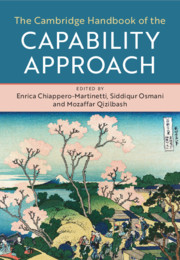Book contents
- The Cambridge Handbook of the Capability Approach
- The Cambridge Handbook of the Capability Approach
- Copyright page
- Dedication
- Contents
- Figures
- Tables
- Contributors
- Foreword
- Acknowledgements
- General Introduction
- Part I Historical Antecedents and Philosophical Debates
- Part II Methods, Measurement and Empirical Evidence
- Part III Issues in Public Policy
- Introduction to Part III
- 25 On Education and Capabilities Expansion
- 26 Capability Approach to Children’s Well-Being and Well-Becoming
- 27 Capability and Disability
- 28 Social Exclusion and Capability Development
- 29 Human Security
- 30 Income Inequality and Human Capabilities
- 31 The Capability Approach and Human Rights
- 32 Capabilities and the Law
- 33 Capabilities, Public Reason and Democratic Deliberation
- 34 Entitlements and Capabilities
- 35 Religion and the Capability Approach
- Index
- References
33 - Capabilities, Public Reason and Democratic Deliberation
from Part III - Issues in Public Policy
Published online by Cambridge University Press: 11 November 2020
- The Cambridge Handbook of the Capability Approach
- The Cambridge Handbook of the Capability Approach
- Copyright page
- Dedication
- Contents
- Figures
- Tables
- Contributors
- Foreword
- Acknowledgements
- General Introduction
- Part I Historical Antecedents and Philosophical Debates
- Part II Methods, Measurement and Empirical Evidence
- Part III Issues in Public Policy
- Introduction to Part III
- 25 On Education and Capabilities Expansion
- 26 Capability Approach to Children’s Well-Being and Well-Becoming
- 27 Capability and Disability
- 28 Social Exclusion and Capability Development
- 29 Human Security
- 30 Income Inequality and Human Capabilities
- 31 The Capability Approach and Human Rights
- 32 Capabilities and the Law
- 33 Capabilities, Public Reason and Democratic Deliberation
- 34 Entitlements and Capabilities
- 35 Religion and the Capability Approach
- Index
- References
Summary
The capability approach offers a perspective on the concept of public reason itself, on its import for social and global justice, and on its import for democracy. (1) While ‘public reasoning’ can describe all attempts at justifying public policies, including bad reasoning, ‘public reason’ is a normative concept implying norms for good reasoning. The capability approach is unsupportive of narrow Rawlsian norms restricting public reason to ‘purely political’ values. It conceives of public reason as relying upon a norm of equal consideration for everyone’s good (modelled in terms such as an impartial spectator, or equal dignity). (2) Valuable capabilities conferring advantage or disadvantage are discoverable by public reason and are not immune to reconsideration by it — thus capability concepts are not dogmatically philosophical. Neither are capability concepts dogmatically democratic: mistakes about valuable capabilities can also be made by existing public reasoning (which can include bad reasons). Combining capability concepts with its norm of equal consideration empowers public reason to detect unjust inequalities without being bound to any theoretical conception of social or global justice. (3) Similar reasoning can be used to assess the degree to which public power is exercised democratically.
- Type
- Chapter
- Information
- The Cambridge Handbook of the Capability Approach , pp. 660 - 676Publisher: Cambridge University PressPrint publication year: 2020

